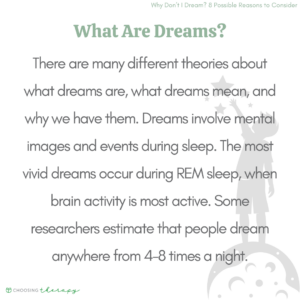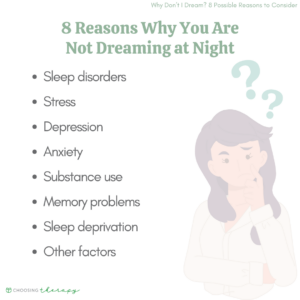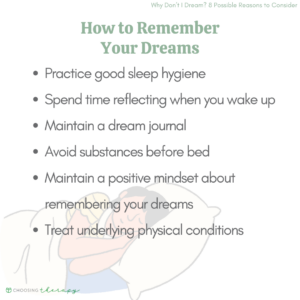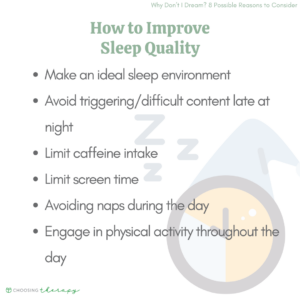It’s believed that most people dream each night. However, there’s far more nuance and variance when it comes to remembering dreams. Some people recall their dreams clearly. Others feel like they never dream at all.1 That said, not dreaming usually has to do with underlying sleep disorders, health conditions, or various medication effects.
Would you like to better understand the meaning of your dreams? BetterHelp has over 20,000 licensed therapists who provide convenient and affordable online therapy. BetterHelp starts at $65 per week. Take a Free Online Assessment and get matched with the right therapist for you.
What Are Dreams?
There are many different theories about what dreams are, what dreams mean, and why we have them. Dreams involve mental images and events during sleep. The most vivid dreams occur during REM sleep, when brain activity is most active.2 Some researchers estimate that people dream anywhere from 4-8 times a night.
Is It Possible to Sleep Without Dreaming?
It’s unlikely that people never dream. It’s far more likely to have issues with REM sleep, memory recall, or other sleep disturbances. Certain substances, such as caffeine, alcohol, benzodiazepines, and psychiatric medications, may affect REM sleep, which may impact dreaming. Likewise, sleep disorders like narcolepsy, insomnia, or obstructive sleep apnea can also cause interruptions, which may correspond with fragmented dreaming.
Are Dreams Connected to Quality of Sleep?
Healthy dreaming generally indicates healthier sleep. At the same time, dream content matters. Frequent patterns of nightmares or night terrors may indicate mental health problems, which can affect sleep and overall health. Recurrent dreams that feel distressing may also indicate unresolved emotional problems. That said, there isn’t much research on whether there’s a direct relationship between dreams and quality of sleep.
8 Reasons Why You Are Not Dreaming at Night
If you can’t remember the last time you dreamed, you might be wondering if this is normal. You might also feel worried about your overall mental or physical health, and you may wonder if that’s connected to your sleep quality. The truth is that many variables can affect sleep, and it’s important to consider both past and current stressors when considering your dreams (or lack thereof).
Here are 8 reasons why you may not be dreaming at night:
Sleep Disorders
Sleep disorders can include sleep apnea, restless legs syndrome, narcolepsy, and insomnia.3 These conditions can all affect sleep quality, and they also tend to decrease the amount of time spent in the actual REM stage. Sleep is closely connected to mental health, and if these conditions are not treated, they may cause or exacerbate emotional distress.
Stress
Both acute and chronic, toxic stress can impact sleep quality and the amount of time spent in REM sleep. This can affect dreaming time and memory recall. Unresolved stress can result in burnout, depression, increased substance use, anxiety, and PTSD- all of which may affect one’s ability to fall or stay asleep at night.
Depression
Many people with depression have recurrent sleep problems, including sleeping too much or not enough. At the same time, they often struggle with feelings of fatigue and lethargy throughout the day. This may also have to do with how depression affects the brain, which affects REM sleep and memory consolidation.
Anxiety
Anxiety can affect every area of functioning, and it can make it challenging for people to settle down or stay asleep throughout the night. It’s unclear if anxiety itself affects dreaming, but it’s likely that it impacts REM sleep and overall sleep quality, which are strongly correlated with each other.
Substance Use
Substance use undoubtedly affects sleep, especially when the substance use is chronic and severe. This applies to alcoholism, marijuana addiction, and opioid use disorder. The effects can also be more pronounced in cases of polysubstance use. Research shows that substance use disorders can contribute to sleep disturbances.4
Memory Problems
Memory problems are varied, but can include mild cognitive impairments, memory loss, and dementia. Certain medications can also trigger forgetfulness or feeling scattered. This can affect how well people recall their dreams, leading them to assume they are not dreaming at all (even if that’s not the case).
Sleep Deprivation
Sometimes sleep loss leads to more intense dreams. Other times, the opposite occurs, and if someone is sleep deprived, they won’t recall their dreams at all. There are many symptoms of sleep deprivation, but some of the main ones include drowsiness, difficulties with concentration, poor memory, irritability, and physical feelings of weakness.5
Other Factors
Because sleep still represents such an unknown landscape in research, it’s quite possible that other unknown variables impact dreaming. As studies continue unfolding, it’s likely we will continue learning more about the specific neuroscience between dreaming, physical well-being, and overall mental status.
Top Rated Online Therapy Services BetterHelp – Best Overall “BetterHelp is an online therapy platform that quickly connects you with a licensed counselor or therapist and earned 4 out of 5 stars.” Visit BetterHelp Online-Therapy.com – Great Alternative In addition to therapy, all Online-Therapy subscriptions include a self-guided CBT course. Visit Online-Therapy.com
How to Remember Your Dreams
Some people enjoy recalling their dreams and processing or breaking them down further. Likewise, such dream work can help you better understand yourself and your needs. However, this can be challenging if you struggle to remember your dreams. If you want to recall your dreams, there are some proactive steps you can take to increase the chances of this happening.
Practice Good Sleep Hygiene
As much as possible, try to optimize your chances of getting a good night’s sleep. Good sleep hygiene means going to bed at a consistent time each night and waking up around the same time each morning. Keep your sleeping environment dark and cool and eliminate distracting clutter. Prioritize having a wind-down routine before you go to bed.
Spend Time Reflecting When You Wake Up
If you do wake up after noticing a dream, don’t just turn to your phone or another distraction. Spend a moment quietly lying in bed and thinking about what happened. Even if you can’t recall a dream, this moment of reflection can help. It may also reawaken images that you thought you had forgotten about.
Maintain a Dream Journal
Dream journals can help you remember your dreams better. The key is to write down as much as you remember as quickly as you wake up. Include as much detail and context as possible. Keep in mind that the longer you delay writing, the more likely you are to forget what happened.
Avoid Substances Before Bed
Alcohol, nicotine, marijuana, and other mood-altering substances can affect dream recall. Consider either abstaining from these drugs or avoiding taking them in the late afternoon or early evening. Doing so may make a difference in your sleep quality, which can impact how well you remember dreams.
Maintain a Positive Mindset About Remembering Your Dreams
Attitude is important when it comes to achieving goals. Believing that you can and will remember your dreams can be helpful in actually doing so. Remember that there’s no “perfect” way to accomplish this, but having confidence can certainly make the process feel easier and more manageable.
Treat Underlying Physical Conditions
If you have a physical sleep disorder, it’s important to seek the right treatment. Medication, lifestyle changes, and other treatments can reduce and even resolve sleep disorder symptoms. This, in turn, can improve your sleep quality and help you better remember your dreams.
How to Improve Sleep Quality
Getting enough high-quality sleep can’t be overstated. Sleep affects every part of functioning. Unfortunately, many people struggle with sleep deprivation and the impacts of poor sleep. If that’s the case for you, it’s important to focus on what’s in your control. Even small changes can make a significant difference in helping you feel better.
You can improve your sleep quality by:
- Making an ideal sleep environment: If possible, invest in high-quality bedding and a comfortable mattress. This makes falling asleep an enjoyable experience.
- Avoid triggering/difficult content late at night: Try to protect your mental well-being by keeping the last hour before bed relatively calm and light.
- Limit caffeine intake: Some researchers suggest eliminating caffeine at least 6-8 hours before bedtime.
- Limit screen time: Scrolling on your phone can cause you to feel hyperactive and distracted, both of which can impact sleep.
- Avoiding naps during the day: If you nap during the day, and you have problems sleeping at night, consider eliminating naps altogether.
- Engage in physical activity throughout the day: Exercise is associated with better sleep, although you may want to avoid heavy workouts late at night.
When to Seek Professional Help
If you have underlying issues impacting your sleep, seeking professional help can make a difference. This is particularly true if you struggle with insomnia or other mental health problems affecting your ability to fall or stay asleep. Your therapist can work with you to increase your overall sleep hygiene, which can translate to feeling more rested overall. Look for a provider who specializes in sleep issues. You can start with a professional online therapist directory to start your search.
To help our readers take the next step in their mental health journey, Choosing Therapy has partnered with leaders in mental health and wellness. Choosing Therapy is compensated for marketing by the companies included below. Online Therapy BetterHelp Get support and guidance from a licensed therapist. BetterHelp has over 20,000 therapists, who provide convenient and affordable online therapy. Complete a brief questionnaire and get matched with the right therapist for you. Get Started Psychiatry, with you in mind Talkiatry Our Psychiatrists Can Diagnose Your Condition, Prescribe Medication, And Monitor Your Progress. Most psychiatry visits cost patients $30 or less* Free Assessment Drinking Moderation Sunnyside Want to drink less? Sunnyside helps you ease into mindful drinking at your own pace. Think lifestyle change, not a fad diet. Develop new daily routines, so you maintain your new habits for life. Take a 3 Minute Quiz Relationship Help OurRelationship (Free Couples Course) OurRelationship has been proven to help couples improve communication, intimacy, and trust. 94% would recommend it to a friend. Get Started Mental Health Support Group App Circles Anytime, anonymous, and free. Never feel alone during life’s greatest challenges. Drop-in to live conversations and share thoughts, ask questions, or learn from others on the same journey. Join Circles Now Free Prescription Discount Card Optum Perks Save up to 80% on most prescriptions. Optum Perks provides discounts at over 64,000 pharmacies nationwide. No memberships or costs to you, ever. It’s really that easy. Get your card and start saving. Get the discount card! *Includes copayment, deductible, coinsurance, and $0 Visits. Excludes no shows.Additional Resources
Online Anxiety Test A few questions from Talkiatry can help you understand your symptoms and give you a recommendation for what to do next. How Does ERP Help With Intrusive Thoughts? Obsessive compulsive disorder (OCD) is a psychiatric condition marked by the presence of obsessive thoughts, images, doubts, or urges, followed by compulsive behaviors or acts aimed at easing the distress caused by the obsession. While the content of the obsessions can take many forms, they are always repetitive, persistent, involuntary, and intrusive, and they often result in a great deal of anxiety for the person experiencing them.










